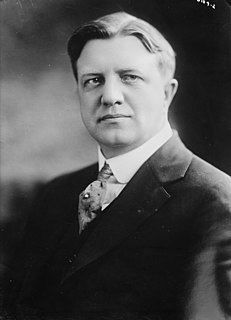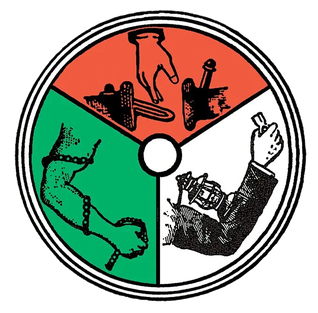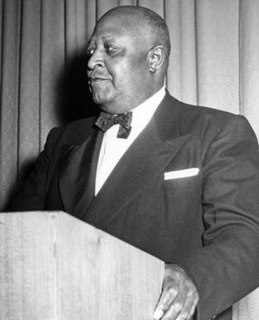Related Research Articles

The Pullman Strike was two interrelated strikes in 1894 that shaped national labor policy in the United States during a period of deep economic depression. First came a strike by the American Railway Union (ARU) against the Pullman factory in Chicago in spring 1894. When it failed the ARU launched a national boycott against all trains that carried Pullman passenger cars. This action stopped most of the passenger and freight trains west of Detroit. President Grover Cleveland took action and obtained a federal court order against the ARU to stop the boycott. It refused and the boycott grew violent. Cleveland sent in the U.S. Army to successfully end the boycott and get the trains moving. The ARU was decisively defeated and its leaders, led by Eugene Debs, went to prison.

Asa Philip Randolph was an American labor unionist, civil rights activist, and socialist politician.

The Pullman Car Company, founded by George Pullman, was a manufacturer of railroad cars in the mid-to-late 19th century through the first half of the 20th century, during the boom of railroads in the United States. Through rapid late nineteenth century development of mass production, and takeover of rivals, the company developed a virtual monopoly on production and ownership of sleeper cars.

The American Railway Union (ARU) was briefly among the largest labor unions of its time and one of the first industrial unions in the United States. Launched at a meeting held in Chicago in February 1893, the ARU won an early victory in a strike on the Great Northern Railroad in the summer of 1893. This successful strike was followed by the bitter 1894 Pullman Strike in which government troops and the power of the judiciary were enlisted against the ARU, ending with the jailing of the union's leadership for six months in 1895 and effectively crushing the organization. The group's blacklisted and dispirited remnants finally disbanded the organization via amalgamation into the Social Democracy of America (SDA) at its founding convention in June 1897.

Founded in 1925, The Brotherhood of Sleeping Car Porters (BSCP) was the first labor organization led by African Americans to receive a charter in the American Federation of Labor (AFL). The BSCP gathered a membership of 18,000 passenger railway workers across Canada, Mexico, and the United States. Beginning after the American Civil War, the job of Pullman porter had become an important means of work in the black community in the United States. As a result of a decline in railway transportation in the 1960s, BSCP membership declined. It merged in 1978 with the Brotherhood of Railway and Airline Clerks (BRAC), now known as the Transportation Communications International Union.

Pullman porters were men hired to work on the railroads as porters on sleeping cars. Starting shortly after the American Civil War, George Pullman sought out former slaves to work on his sleeper cars. Their job was to carry passengers’ baggage, shine shoes, set up and maintain the sleeping berths, and serve passengers. Pullman porters served American railroads from the late 1860s until the Pullman Company ceased operations on December 31, 1968, though some sleeping-car porters continued working on cars operated by the railroads themselves and, beginning in 1971, Amtrak. The term "porter" has been superseded in modern American usage by "sleeping car attendant", with the former term being considered "somewhat derogatory".

Clarence Cleveland Dill was an American politician from the state of Washington. A Democrat, he was elected to two terms each in both houses of Congress.

The Transportation Communications Union (TCU) is the successor to the union formerly known as the Brotherhood of Railway Clerks and includes within it many other organizations, including the Brotherhood of Railway Carmen of America and the Brotherhood of Sleeping Car Porters, that have merged with it since 1969.

Cottrell Laurence Dellums was an American labor activist and one of the organizers and leaders of the Brotherhood of Sleeping Car Porters.
Railway Labor Executives' Association (RLEA) was a federation of rail transport labor unions in the United States and Canada. It was founded in 1926 with the purpose of acting as a legislative lobbying and policy advisory body. At times, it played a prominent role in setting rail transport policy in the U.S., and was party to six U.S. Supreme Court cases. It disbanded in January 1997, with representation, collective bargaining, and legislative lobbying assumed by the newly formed Rail Division of the AFL-CIO Transportation Trades Department.

The Brotherhood of Railroad Trainmen (BRT) was a labor organization for railroad employees founded in 1883. Originally called the Brotherhood of Railroad Brakemen, its purpose was to negotiate contracts with railroad management and to provide insurance for members.

William Parker Kennedy was president of the Brotherhood of Railroad Trainmen (BRT) from 1949 to 1962.

The Order of Railway Conductors of America (ORC) was a labor union that represented train conductors in the United States. It has its origins in the Conductors Union founded in 1868. Later it extended membership to brakemen. In 1969 the ORC merged with three other unions to form the United Transportation Union.
Harry W. Fraser was an American labor leader who was president of the Order of Railway Conductors (ORC) from 1941 to 1950.

Austin Bruce Garretson was an American labor leader who was head of the Order of Railway Conductors from 1906 to 1919. He gained national prominence in 1916 when he averted a nationwide railroad strike in exchange for an eight-hour day with time-and-a-half overtime pay.
The International Association of Railway Employees (IARE) was a union for black railroad workers formed in 1934 at a time when the major railroad brotherhoods restricted membership to whites. Members included conductors, trainmen, engineers, shop mechanics, porters and maintenance-of-way employees. It joined the United Transportation Union in 1970.

George Washington Howard was an American railway worker and trade union functionary. Howard is best remembered as the head of the Brotherhood of Railway Conductors (BRC), a rival to the Order of Railway Conductors (ORC) which was established in 1885 and absorbed into the older organization in 1891. Howard was also the Vice President of the American Railway Union from 1893 to 1894 and was an important figure in the failed Pullman Strike of 1894.

Milton Price Webster (1887-1965) was an American trade unionist, best remembered as the first Vice-President of the Brotherhood of Sleeping Car Porters (BSCP) and leader of its Chicago division. As the union's lead negotiator, Webster was influential in securing a collective bargaining agreement with the Pullman Company — the first national contract won by any black-led American trade union.
Halena Wilson was an American activist, educator, and cooperative movement leader based in Chicago. She served as president of the Ladies Auxiliary to the Brotherhood of Sleeping Car Porters from 1930 to 1956.
References
Citations
- ↑ Hirsch 2003, p. 73.
- ↑ Stewart 1936, p. 252.
- 1 2 Stewart 1936, p. 253.
- ↑ Hirsch 2003, p. 86.
- ↑ Chateauvert 1997, p. 29.
- 1 2 3 4 Galenson 1960, p. 626.
- ↑ Brotherhood of Sleeping Car Porters: Windsor Mosaic.
- ↑ Chateauvert 1997, p. 68.
- ↑ Bynum 2010, p. 138.
- ↑ Arnesen 2009, p. 106.
- ↑ Hirsch 2003, p. 173.
- ↑ Gerard 2007, p. 315.
- ↑ ORC&B reigned for a century: UTU.
Sources
- Arnesen, Eric (2009-06-30). Brotherhoods of Color: Black Railroad Workers and the Struggle for Equality. Harvard University Press. p. 106. ISBN 978-0-674-02028-3 . Retrieved 2013-08-08.
- "Brotherhood of Sleeping Car Porters". Windsor Mosaic Website. Retrieved 2013-08-07.
- Bynum, Cornelius L. (2010). A. Philip Randolph and the Struggle for Civil Rights. University of Illinois Press. ISBN 978-0-252-03575-3 . Retrieved 2013-08-08.
- Chateauvert, Melinda (1997-01-01). Marching Together: Women of the Brotherhood of Sleeping Car Porters. University of Illinois Press. ISBN 978-0-252-06636-8 . Retrieved 2013-08-08.
- Galenson, Walter (1960). The CIO Challenge to the AFL: A History of the American Labor Movement, 1935-1941 . Harvard University Press. p. 626. GGKEY:BFBCR84E4KZ. Retrieved 2013-08-08.
- Gerard, Gene C. (2007). "Fraser, Harry W.". Home Front Heroes: A Biographical Dictionary of Americans During Wartime, Volume 1. Greenwood Publishing Group. ISBN 978-0313334214 . Retrieved 2013-08-07.
- Hirsch, Susan E. (2003). After the Strike: A Century of Labor Struggle at Pullman. University of Illinois Press. ISBN 978-0-252-02791-8 . Retrieved 2013-08-08.
- "ORC&B reigned for a century". UTU. Archived from the original on 2013-06-17. Retrieved 2013-08-07.
- Stewart, Estelle May (1936). Handbook of American trade-unions: 1936 edition. U. S. Govt. Print. Off. for the United States. Bureau of Labor Statistics. p. 252 . Retrieved 2013-08-07.